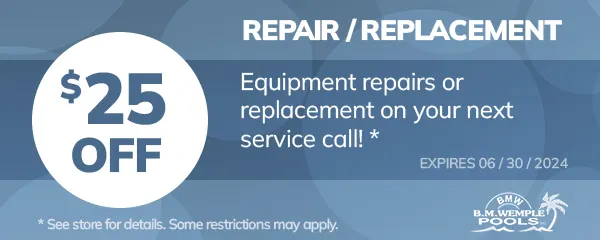A cool dive into a pool or a pool party with friends on a hot summer day is something many of us look forward to. However, sometimes a pool pump that won't do its joband can get in the way of your fun. The pool pump is like the heart of your pool system. It is responsible for pulling water from the pool to be heated, treated, and filtered. This process allows you to have clean and warm water in your pool.
Pool pumps turn over the water several times, remove debris from your pool, and help circulate the chemicals needed to stop the growth of algae and other microorganisms in the pool. No doubt, the pool pump is a vital part of your pool system. So, the question is, how do you know when your pool pump isn't working or what do you do when your pool pump is not working?

Common Issues You Will Face When Having a Pool Pump
Pump Not Pulling Water or Running Slowly
This is a common issue and can potentially be an easy fix. First, check that the pump is plugged in correctly and all connections are secure. If it still isn't running or running slowly, you may have a clogged basket or strainer. This can happen if leaves and other debris get caught in parts of the pump. You should clean out your filter often to solve this problem.
However, if cleaning out your filter does not help, you may need to check the suction line for a leak. It is better to get a professional pool contractor to fix this issue because suction lines are challenging to fix.
Pump Leaking Water
If your pump is leaking water, the first thing you should do is check all connections and make sure they are tight. If the leak continues, it may result from corrosion affecting the o-rings or seals. You can try replacing these yourself, but if you are not sure you can do this without causing any more damage, it is better to get professional help.
Motor Not Working
If your pool pump motor is not working, check for a tripped circuit breaker or a blown fuse. If this does not solve the issue, it could be an electrical problem, such as a faulty capacitor. If so, call a professional because chances are the motor would need to be replaced.
Motor Cutting Out
If your pool pump keeps stopping after working for a while, you should check for overheating. You might notice that your pump cuts out during the hot weather so you should try installing a motor cover to protect your motor from sunlight. You can also try cleaning out the vents of the motor to let in more air for cooling.
Noisy Pump
If your pool pump makes a grinding or rattling noise, it could mean something is stuck in the impeller or motor. First, check for any debris causing this noise and remove it. If the noise persists, you may need to replace the bearings or even the entire motor.
When to Replace a Pool Pump
Generally, a pool pump should last about eight to fifteen years. However, if your pool pump has begun to malfunction frequently or is not working, it may be time to replace it. Newer, more energy-efficient models can save you money in the long run and can make your pool system run smoother.
Overall, a pool pump is essential to maintaining a clean and enjoyable pool. By fixing any issues and replacing parts when necessary, you can keep your pool pump running smoothly and enjoy a cool dip in the pool on hot summer days.
Troubleshooting and Repairing Your Pool Pump
- Check the power source to ensure it's on and that the circuit breaker has not been tripped. Also, check that the timer is set properly.
- If your pool pump is still not working, try checking the strainer lid and basket for debris or clogs. Clean out any debris or clear out any clogs to see if that improves the pump's performance.
- Next, check to see if there are air bubbles in the pump. Sometimes, air can get trapped in the system, slowing the water flow and causing strange noises. Turn off the pump and locate the air release valve to release any trapped air. Use a screwdriver to open up the valve and let any air escape. Turn on the pump again to see if that fixed the issue.
- If the pump is still not working properly, it may be time to call a professional. It could be that the impeller or motor of the pump needs to be replaced.
Preventive Measures for Your Pool Pump
- Regularly clean the strainer basket and lid to prevent clogs or debris buildup.
- Check the filter system and clean or replace it as needed to ensure proper water flow.
- Inspect and tighten any loose fittings or connections to avoid leaks.
- Make sure to properly winterize the pump if you live in a colder climate.
- Schedule regular maintenance checks with a professional to catch any potential issues before they become major problems.
By taking these preventive measures, you can extend the lifespan of your pool pump and keep it running efficiently for years to come.
How Much Does It Cost to Replace a Pool Pump
Sometimes, more than simple maintenance and repairs will be needed to solve the issues you have with your pool pump, and you may need to opt for a total replacement. Replacing a pool pump will cost you the actual price of the pool pump and the replacement cost charged by the pool contractors. Pool pumps vary in price. The exact cost of a pool pump will be determined by the pump size, pump type, brand, pool size, and pool type. The cost of replacement will be determined by the contractors. It is advisable to always opt for high-quality service instead of low cost when choosing a contractor.
BMWemple - A Most Trusted Pool Builder and Maintenance in Central Florida
When choosing a pool builder and maintenance service in Central Florida, you need to select a service that gives you the greatest value for your money and the best customer service. BMWemple Pools is Central Florida's #1 trusted pool maintenance and renovations company that offers pool pumps and repairs, and more. With BMWemple Pools, you can be sure there will be no more botched pool hangouts!






